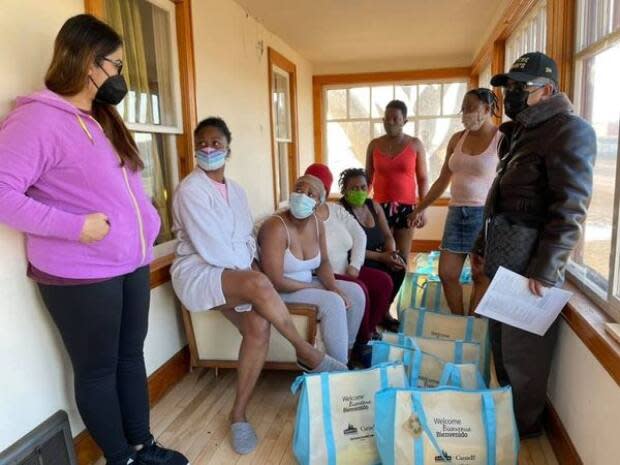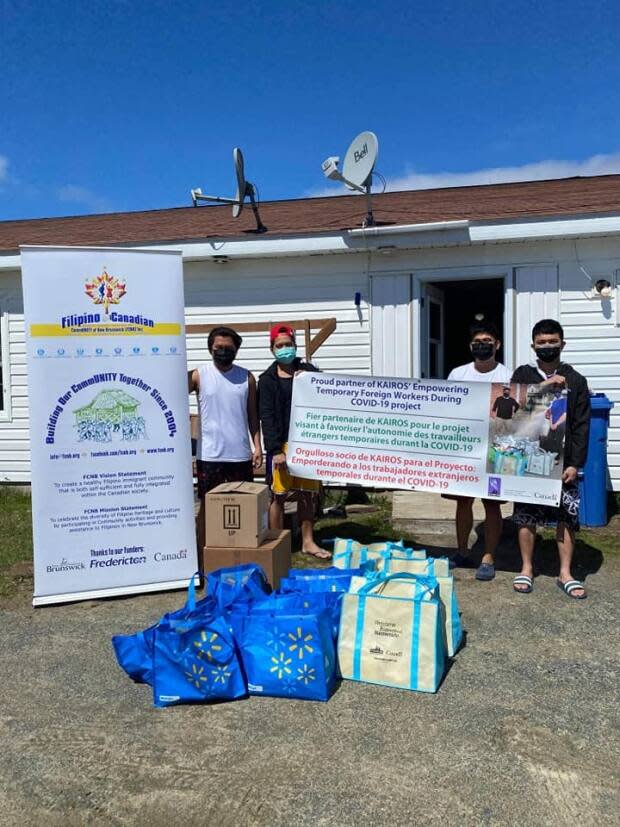N.B. Filipino community helps integrate migrant workers during COVID-19

Welcoming temporary foreign workers into the province is a regular task for the Filipino-Community of New Brunswick (FCNB).
But when the pandemic hit last year the non-profit organization, also known as FCNB, had to double down on its efforts to remotely contact and support the migrant workers.
"Our biggest challenge was to find the workers," said Fredericton-based project coordinator Jesabel Amora. "It was really hard. But when we started slowly getting people, word of mouth actually spread everywhere."
With over $130,000 to fund the initiative, the group provided information on worker rights through flyers and webinars and delivered essential goods in COVID-19 care kits during their quarantine.
A lot of money was spent on hiring people to track down the migrant workers themselves, and the costs associated with delivering goods in person, says Amora.
"It's the feeling of fulfilment that you were able to help them, even though you're not asking something in return," said Amora. "You see their faces that they're so happy and grateful for all the help that they have received from us."
Need for migrant workers in New Brunswick
Travel restrictions to get into Canada hindered the work permit process for seasonal foreign workers that many employers rely upon.
In New Brunswick, hard-hit fishing and agricultural sectors could not find residents of the province who were willing to step in and fill the gap temporary workers often inhabit.
Amora said the migrant workers included many from the Philippines, as well as Russia, China and Jamaica.

Although the program was aimed at helping agricultural workers, FCNB also helped workers in fishing, aquaculture, trucking. hospitality and restaurant sectors, according to Amora.
Many of the workers lived in more remote, rural areas of the province, especially in the north and northeast.
Building trust with temporary foreign workers
Amora said it took time to build trust. One group of Filipino migrant workers arrived from Taiwan and refused to accept offers of groceries and COVID-19 care kits at first.
"When they saw that there were pictures on our Facebook page, that we helped their colleagues from other batches, then they believed that we were not a scam," said Amora.
"That's why we have to post on Facebook everything that we do — not just because it's documented, but it's telling them that we're really out there helping, and we are still looking for a lot of people to help."
Filipino migrant worker Rafael Lloyd Tan, who arrived in the province in December of 2019, knows how difficult settling into a new community has been for workers arriving during the pandemic.

"Coming here when there's no COVID, it was smooth, everything was fine. But as per experience from my co-workers, from other Filipino people [and other immigrants], I hear from their stories. They told me that it's too hard coming here, it's difficult for them to enter Canada during COVID-19 restrictions."
FCNB was there to welcome him into the province upon his arrival to New Brunswick and this past spring he received a COVID care kit through their temporary foreign workers program.
Now, Tan is an active member of their organization.
"If there will be new programs, I'll be willing to help," said Tan, who's based in Fredericton. "It's really helpful for the community. For myself, my wife is not here, I'm just lonely. But because of them, I feel like I'm in the Philippines, with family also."
An Ontario and Maritime initiative
KAIROS Canada, a faith-based social justice organization, has been advocating for migrant worker rights for close to 14 years.
When the pandemic hit, the organization reached out to community partners like FCNB to be the first point of contact for migrant workers in the agriculture sector entering Ontario and the Maritimes.
"This year, this project is a very relevant and needed response to COVID-19 to mitigate the risk and the situation facing migrant farm workers," said KAIROS migrant justice program coordinator Connie Sorio.
"We've seen how hugely dependent we are in terms of the contributions of these men and women who labour [in] our fields to ensure that we have food security."
The program was granted $2.18 million in funding in December by the Government of Canada's Temporary Foreign Worker Program. Organizations started reaching out to migrant workers throughout the winter, and will stop once the program comes to an end on June 30.
According to Sorio, about 25,000 migrant workers were helped through this initiative across all partner organizations.

 Yahoo Finance
Yahoo Finance 